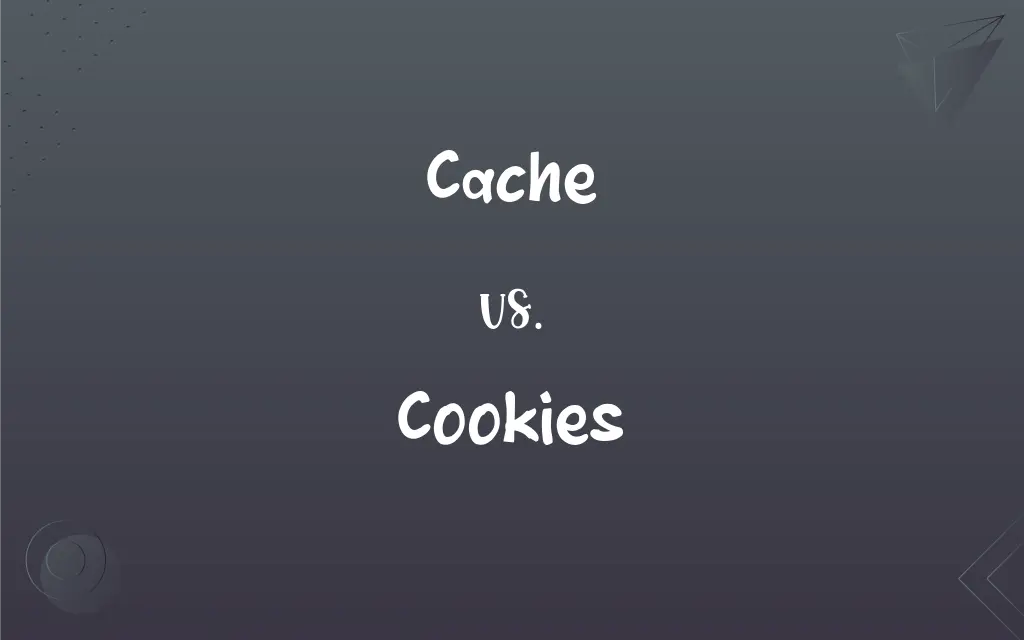Cache vs. Cookies: What's the Difference?
Edited by Aimie Carlson || By Harlon Moss || Published on March 4, 2024
Cache stores copies of web pages and resources to speed up loading; cookies save user data for personalized web experiences.

Key Differences
Cache is used to store local copies of web resources like HTML pages, images, and JavaScript files to reduce loading times and bandwidth usage on subsequent visits. Cookies, in contrast, are small pieces of data stored by a browser that retain user-specific information, such as login details, preferences, and browsing history, to personalize the web experience.
Cache data is stored locally on a user's device and primarily enhances performance by reducing the need to download the same content repeatedly. Cookies, however, can have implications for privacy and tracking, as they store personal information and can be used by websites to track users' browsing activities across the internet.
Cached data often has a set expiration time after which it is refreshed, but users can clear their cache manually. Cookies have varying lifespans, set by the website, and can persist across sessions, but users can also clear cookies or set their browsers to reject them.
Cache stores content like web page layouts and multimedia content, which helps in faster rendering of previously visited pages. Cookies store user-specific data like session tokens, language preferences, and other settings that enable websites to remember users and their preferences.
The cache is generally larger in size and plays a crucial role in the technical performance of web browsing. Cookies are smaller in size and are more about personalizing and enhancing the user experience on individual websites.
ADVERTISEMENT
Comparison Chart
Primary Purpose
Enhances loading speeds and efficiency
Stores user preferences and session data
Data Stored
Web pages, images, and scripts
User information and preferences
Impact on Privacy
Minimal privacy concerns
Potential privacy implications
Duration
Temporary, often automatically cleared
Persistent, based on set expiration dates
Role in Web Browsing
Technical performance
Personalization and user experience
ADVERTISEMENT
Cache and Cookies Definitions
Cache
Cache is a storage location for temporary copies of web content.
The website loaded quickly thanks to the files stored in the cache.
Cookies
Cookies are small data files stored by websites to remember users.
The shopping site used cookies to remember my cart items.
Cache
Cache reduces bandwidth and improves loading speed.
Clearing the cache often solves the issue with outdated page content.
Cookies
Cookies store preferences and login information.
Cookies on the news site remember my subscription details.
Cache
Cache holds data that a browser can reuse.
The browser's cache retained the images, speeding up the page reload.
Cookies
Cookies are managed by web browsers and can be cleared by users.
Clearing cookies and cache often resolves login issues.
Cache
Cache helps in quick retrieval of web data.
Thanks to the cache, revisiting the website was much faster.
Cookies
Cookies enhance user experience by personalizing content.
Cookies enabled the website to display content in my preferred language.
Cache
A fast storage buffer in the central processing unit of a computer. Also called cache memory.
Cookies
Cookies can track browsing history and activities.
Advertisers use cookies to display personalized ads.
Cache
(computing) A fast temporary storage where recently or frequently used information is stored to avoid having to reload it from a slower storage medium.
Cookies
(Computers) A collection of information, usually including a username and the current date and time, stored on the local computer of a person using the World Wide Web, used chiefly by websites to identify users who have previously registered or visited the site.
Cache
Cache is used to store frequently accessed web resources.
The cache keeps local copies of stylesheets to render the website faster.
FAQs
How does cache improve web browsing?
Cache improves browsing by storing web resources locally, reducing load times.
What is a cache?
Cache is a temporary storage area for web content to enhance loading speeds.
Is it safe to clear cache?
Yes, clearing cache is safe and can often resolve loading or formatting issues.
How often should I clear my cache?
Clearing cache periodically can help with performance, but frequency depends on your browsing habits.
Does clearing cache remove saved passwords?
No, clearing cache does not typically remove saved passwords.
What are cookies?
Cookies are small data files used by websites to store user information and preferences.
Can cookies track your browsing activities?
Yes, some cookies can track browsing activities across multiple sites.
Can cookies pose a security risk?
Cookies can be a security concern if they store sensitive information insecurely.
Can cache increase internet speed?
Cache doesn't increase internet speed but reduces load times for previously visited sites.
What is the main benefit of cookies?
The main benefit of cookies is personalizing and streamlining the user experience.
What information do cookies typically store?
Cookies store information like login details, preferences, and browsing sessions.
Are cookies essential for online shopping?
Cookies are often used in online shopping to remember cart items and user preferences.
Do all websites use cookies?
Most websites use cookies, but their use can vary widely.
What happens if I disable cookies?
Disabling cookies may affect personalized content and user experience on websites.
Does cache take up a lot of space?
Cache can take up significant space, depending on your browsing habits.
Are cookies automatically deleted?
Some cookies are automatically deleted after a session, while others persist longer.
Can clearing cache solve website access issues?
Yes, clearing cache can resolve access and display issues on websites.
How long is data stored in the cache?
Cached data is stored until it is overwritten or cleared by the user.
Why do websites ask for cookie permissions?
Websites ask for cookie permissions due to privacy laws and user consent requirements.
Do cookies slow down browsing?
Cookies generally do not slow down browsing and are used to enhance user experience.
About Author
Written by
Harlon MossHarlon is a seasoned quality moderator and accomplished content writer for Difference Wiki. An alumnus of the prestigious University of California, he earned his degree in Computer Science. Leveraging his academic background, Harlon brings a meticulous and informed perspective to his work, ensuring content accuracy and excellence.
Edited by
Aimie CarlsonAimie Carlson, holding a master's degree in English literature, is a fervent English language enthusiast. She lends her writing talents to Difference Wiki, a prominent website that specializes in comparisons, offering readers insightful analyses that both captivate and inform.































































